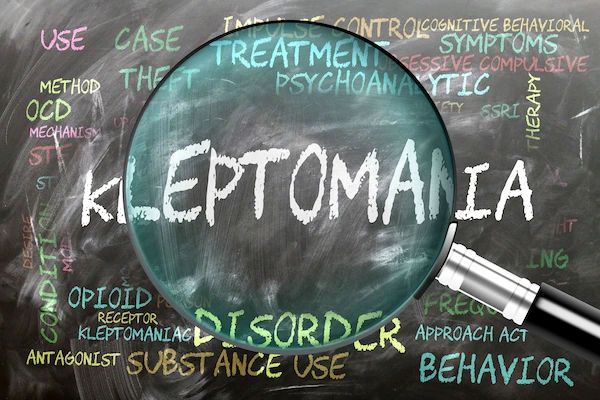Kleptomania and Mental Health: Understanding the Hidden Struggle
Struggling with kleptomania? Learn about its causes, mental health links, treatment options, and recovery strategies to regain control and live a healthier life.

Written by Dr.Sonia Bhatt
Last updated on 3rd Jul, 2025
Have you ever found yourself impulsively drawn to something, unable to resist the urge even though you know it’s wrong? This is what you will experience if you have kleptomania feels. It is a complex mental health disorder in which you will feel an uncontrollable urge to steal. Kleptomania can be a result of various factors, such as anxiety, depression, and other psychological conditions. The article explains how kleptomania affects the mind and what you can do to manage it.
Understanding Kleptomania
Kleptomania can set off an intense desire to steal. Once done, you will experience guilt and regret. It’s not about greed or necessity but an uncontrollable cycle that can take over your life.
Definition and Characteristics
You might assume stealing is a choice, but for someone with kleptomania, it’s not. This disorder causes a compulsive urge to steal, driven by impulse rather than need. The rush of excitement quickly turns into guilt, yet the cycle repeats. Many people with kleptomania don’t even use what they take—they just can’t stop themselves.
Causes and Risk Factors
So, why does this happen? Your brain chemistry could be to blame. A dopamine rush after stealing reinforces the habit, much like an addiction. Genetics, trauma, anxiety, or OCD may also play a role. If you relate to this, know that kleptomania isn’t a flaw—it’s a mental health condition, and help is available.
Relationship with Mental Disorders
Kleptomania isn’t just about stealing—it’s often connected to deeper mental health issues. If you’ve ever felt stuck in this cycle, understanding these links can help you find the right support and take steps toward recovery.
Common Comorbidities
Kleptomania rarely appears on its own. It’s commonly linked to anxiety, depression, OCD, or substance abuse. You might feel a brief sense of relief after stealing, but the guilt and stress that follow can make things worse. Some people with bipolar disorder also experience kleptomania during manic episodes, highlighting its strong connection to mental health. Treating kleptomania often means addressing these underlying conditions too.
Impact on Overall Mental Health
Struggling with kleptomania can take a serious toll on your well-being. The guilt, fear, and shame can make you feel isolated, affecting your relationships and self-esteem. Over time, untreated symptoms may lead to depression or even suicidal thoughts. But there’s hope—help is available, and with the right treatment, you can break free from this cycle.
Diagnosis of Kleptomania
If you’ve ever wondered whether kleptomania is just impulsive stealing or something deeper, the answer lies in a proper diagnosis. It’s not about bad habits—it’s a recognised mental health disorder with specific criteria. Understanding how professionals diagnose it can help you or someone you know take the first step toward recovery.
Diagnostic Criteria
Kleptomania is diagnosed based on clear signs. You might feel an intense urge to steal, struggle to resist it, and later feel guilt or regret. Unlike planned theft, there’s no personal gain involved—just an uncontrollable impulse. The condition is listed in the DSM-5 (a mental health diagnostic manual), making it a medically recognised disorder, not a character flaw.
Assessment and Behavioral Analysis
Diagnosing kleptomania isn’t just about asking questions—it involves understanding your emotions and behavior patterns. A mental health professional may assess your history, triggers, and mental state to rule out other disorders like impulse control issues or bipolar disorder. Psychological tests and therapy sessions can help uncover underlying causes, leading to a tailored treatment plan. Seeking help isn’t a sign of weakness—it’s the first step toward regaining control.
Treatment Approaches
Kleptomania can feel like an endless cycle, but the good news is—effective treatments exist. If you’ve been struggling with compulsive stealing, the right combination of therapy and medication can help you regain control.
Psychotherapy Options
Talking to a mental health professional can make a big difference. Cognitive Behavioral Therapy (CBT) is one of the most effective treatments, helping you identify triggers and develop coping strategies. Another approach, Aversion Therapy, conditions you to associate stealing with negative consequences, reducing the urge over time. Support groups and counseling also provide a safe space to share your struggles and find encouragement.
Medications
Sometimes, therapy alone isn’t enough. Medications like SSRIs (used for depression and anxiety) help balance brain chemicals, reducing impulsive urges. In some cases, mood stabilizers or addiction-treatment drugs may be prescribed. The right treatment plan varies for everyone, so working with a doctor ensures the best approach for you. Remember, seeking help isn’t just an option—it’s a step toward freedom.
Challenges in Managing Kleptomania
Overcoming kleptomania isn’t just about breaking the habit—it’s about fighting stigma, misunderstandings, and the risk of relapse. If you’ve ever felt judged or hopeless, know that you’re not alone. Managing this condition takes time, patience, and the right support.
Stigma and Misunderstandings
Many people assume kleptomania is just stealing by choice, but that couldn’t be further from the truth. You may have faced judgment, even from those closest to you, making it harder to seek help. The guilt and shame can feel overwhelming, but remember—kleptomania is a medical condition, not a moral failing. Raising awareness and finding supportive communities can make a huge difference.
Relapse and Coping Strategies
Managing kleptomania isn’t always a straight path—relapses happen. Stress, emotional triggers, or untreated mental health issues can bring back old urges. But setbacks don’t mean failure. Identifying triggers, practicing mindfulness, and sticking to therapy can help. If a relapse happens, don’t dwell on guilt—refocus on progress. Every step forward counts, and with the right strategies, long-term recovery is possible.
Recent Research and Developments
Kleptomania has puzzled experts for years, but new research is finally providing answers. If you’ve ever wondered why this condition happens or how it can be treated, exciting breakthroughs in neuroscience and psychology are bringing fresh hope.
Advances in Understanding Kleptomania
Scientists now believe kleptomania isn’t just about poor self-control—it’s linked to how your brain processes impulses and rewards. Research shows that areas like the prefrontal cortex (which helps with decision-making) don’t function properly in people with kleptomania. Studies also suggest that dopamine imbalances make stealing feel temporarily rewarding, reinforcing the cycle. Advanced brain scans are helping experts see these differences, proving that kleptomania is a medical issue, not a personal failing.
Future Directions in Treatment
Exciting treatments are being explored! Transcranial magnetic stimulation (TMS) is showing promise in helping regulate brain activity, while new medications aim to target impulse control more effectively. Researchers are also studying personalized therapy approaches based on brain chemistry. As science advances, better treatments will emerge, giving you more options to manage kleptomania and regain control over your life.
Supporting Individuals with Kleptomania
If you or someone you know struggles with kleptomania, support can make all the difference. Judgment and shame only make things worse, but understanding and encouragement can help in the journey to recovery.
Role of Family and Friends
Having loved ones who listen without blame is crucial. If someone close to you is dealing with kleptomania, avoid criticism—it’s not a choice but a mental health condition. Instead, offer reassurance, encourage treatment, and create a safe space for open conversations. Your support can reduce feelings of isolation and shame, making it easier for them to seek help.
Importance of Professional Support
While emotional support matters, professional help is essential. Therapists, psychiatrists, and support groups provide guidance tailored to individual needs. Cognitive Behavioral Therapy (CBT) and medications can help manage urges effectively. Seeking help isn’t a sign of weakness—it’s a step toward regaining control. If you or a loved one is struggling, reaching out to a professional is one of the best things you can do.
Positive Outcomes and Recovery
Kleptomania may feel overwhelming, but recovery is absolutely possible. With the right treatment, support, and mindset, many people have regained control over their impulses and rebuilt their lives. If you’re struggling, know that you’re not alone—there is hope.
Success Stories
People who once felt trapped in the cycle of stealing have found freedom through therapy, medication, and strong support systems. Some have used Cognitive Behavioral Therapy (CBT) to rewire their thought patterns, while others found relief through mindfulness and self-awareness techniques. Every small victory counts—whether it’s resisting an urge, seeking help, or opening up to loved ones. Progress may not be instant, but real change happens one step at a time.
Lifestyle Changes and Mental Health
Long-term recovery isn’t just about stopping the behavior—it’s about improving overall well-being. Simple lifestyle changes like stress management, regular exercise, and healthy routines can help regulate emotions and reduce impulses. Surrounding yourself with supportive people and engaging in therapy can strengthen your mental resilience. Remember, setbacks don’t erase progress. With patience and persistence, a life free from kleptomania is within reach.
Conclusion
Kleptomania isn’t just about stealing—it’s a mental health disorder that requires understanding and proper treatment. You’ve seen how it’s linked to other conditions, the challenges of managing it, and the hope that comes with the right support. Therapy, medication, and lifestyle changes can help you or a loved one regain control.
Looking ahead, advancements in neuroscience and personalized treatments will offer even better recovery options. With growing awareness, the stigma around kleptomania will continue to fade, making it easier for people to seek help. Recovery is possible, and with the right steps, a healthier, more balanced life awaits.
Consult Top Neurologist
Consult Top Neurologist

Dr. Amit Kapoor
Neurosurgeon
18 Years • D.N.B NeuroSurg.
Delhi
Apollo Hospitals Indraprastha, Delhi

Dr Debnath Dwaipayan
Neurosurgeon
9 Years • MBBS, MS(Gen. Surgery), DrNB (Neurosurgery)
Delhi
Apollo Hospitals Indraprastha, Delhi
Dr. Aleti Venkat Reddy
Neurologist
14 Years • MBBS, MD (GEN MEDICINE), DM NEUROLOGY, FEAN
Secunderabad
Apollo Hospitals Secunderabad, Secunderabad

Dr. Ganeshgouda Majigoudra
Neurologist
10 Years • MBBS, MD ( GENERAL MEDICINE) DM (NEUROLOGY)
Bengaluru
Apollo Clinic, JP nagar, Bengaluru

Dr. Sarthak Mehta
Neurologist
6 Years • MBBS , MS Mch ( Neuro )
Bengaluru
Apollo Clinic, JP nagar, Bengaluru




